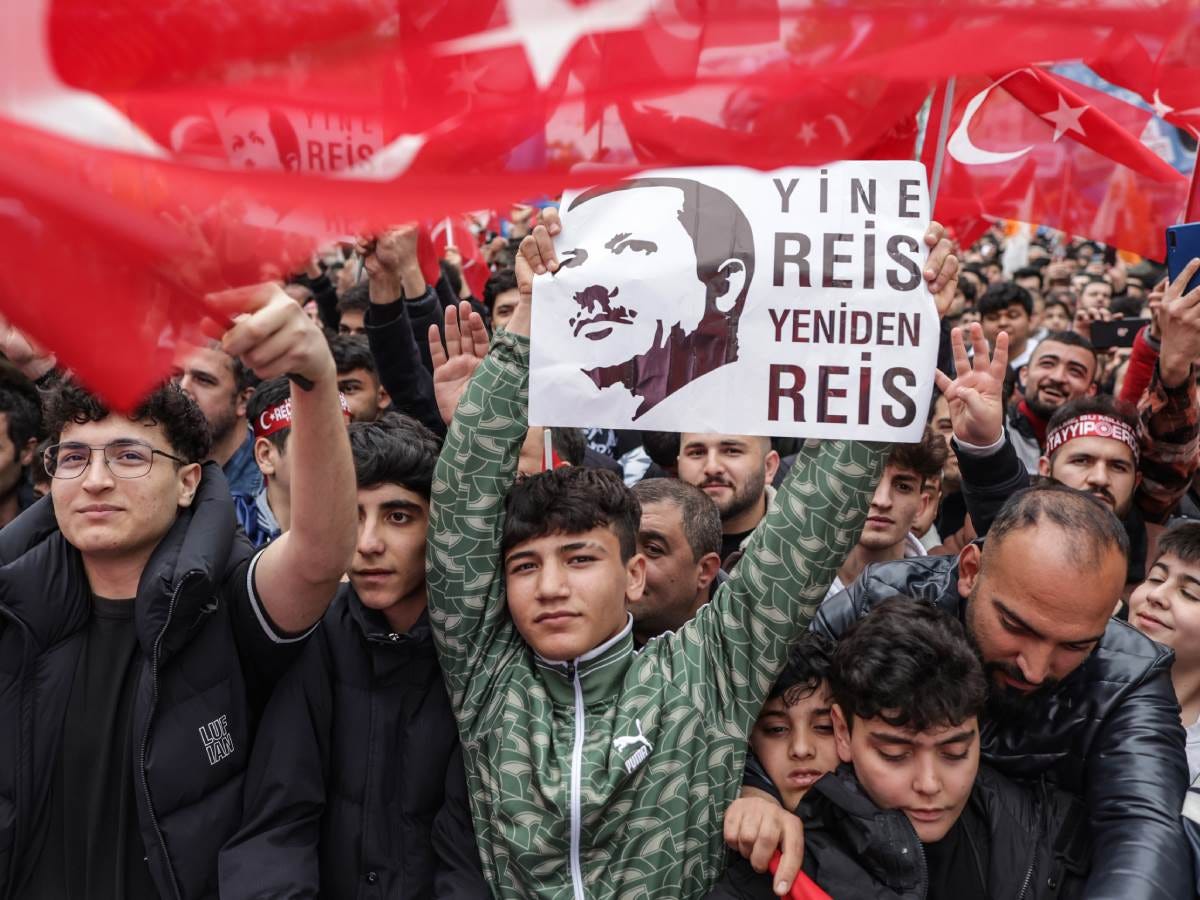There are a lot of ways to refer to Erdoğan, and they all have different connotations. If someone uses “başkan Erdoğan” or “cumhurbaşkanımız,” [our president] it means they support him. If they say “cumhurbaşkanı Erdoğan” [president Erdoğan] they’re keeping a critical distance while acknowledging his legitimacy as elected president. “Tayyip” can be affectionate, or it can be disrespectful, depending on the tone. “Tayyip baba” [father Tayyip] is a common variation, and I hear it among low-ranking civil servants sometimes. “Uzun adam” [The tall man] was originally a Gülenist code name for the then-Prime Minister, and hence derogatory, but it has been turned upside-down, and now serves as a term of praise. “Usta” [the master] was part of a campaign slogan in 2011, and refers to Erdoğan’s man’s political acumen.
Among all these names, there is one that’s used more than any other: reis. If you’ve been around Erdoğan’s followers, you’ll have heard all kinds of variations. If you’re sitting around in a cafe, for example, and someone turns on the TV, he might say something like “let’s see what the reis has to say today.” People celebrating the electoral win this year were shouting “the reis has won!” Fervent Erdogan followers are often called “reisçi” [reis-adherents.] Erdoğan’s 2016 biopic (below) was simply entitled “Reis.”
People sometimes assume that “reis” springs from Erdoğan’s official title as president, or that it comes from the Islamist tradition. Neither is true. It’s actually a very strange title for an Islamist leader to have and the public only started using it about a decade ago. I think the extent of its use tells us a bit about the right-wing mix behind the regime that’s being built in Turkey today.
Let’s take a closer look.
What does “reis” mean?
Arabic speakers will immediately recognize the word (رئيس) as literally “head” and is used to mean “chief” or “leader.” In modern usage, it’s the word for “president,” so the president of the United States, for example, is a “rais” in Arabic.
That is not how the word is used in Turkish. In Ottoman usage, the word “reis” referred to sea captains. So Pîrî Reis is the famous Ottoman navigator and cartographer, Oruç Reis was a famous corsair (and a currently the name of a research vessel), and Temel Reis is the Turkish name for Popeye the Sailor Man.
In Turkish today, the word for “president” is “başkan.” The president of Turkey is slightly different in that he is a “Cumhurbaşkanı” [president of the public]. If you want to be old-fashioned, you can call him “reis-i cumhur,” but that’s still an official title. A president’s staff wouldn’t ever call him “reis,” they’d call him “beyefendi,” which roughly means “the gentleman.”
In more popular usage, reis is a leader or boss of some sort. The most frequent usage is in relation to the head of the family, so a father might think of himself as “ailenin reisi” or the “reis of the family.” In a looser sense, reis is a colloquial way to address someone. So when young men meet up, they might say “how’s it’s going reis,” the way British people address each other as “governor” (or just “gov”), and Americans might call each other “boss.”
Bear with me, we’re getting closer now.
In a political context, reis has a very specific meaning: it’s how pan-Turkic nationalists (Ülkücü) address their superiors. To give you a bit of context here, if you’re young and you’re serious about your Turkism, chances are you’re connected to the Ülkü Ocağı (nationalist hearth) in your school or university. That “hearth” is going to be organized according to a pretty clear hierarchy, and the boss there is going to be called “reis.” That’s his official title. So say you’re wondering about the “hearth boss” at Hacettepe University, you’d say “who’s reis at Hacettepe?” That’s “the reis,” but you also still call everyone superior to you reis. So let’s say you’re a first year Ülkücü at Hacettepe, and a mid-ranking member has told you that you are to pass out flyers for a talk your heath is organizing. When you’re talking to that mid-ranking superior, you wouldn’t use his name to address him like a normal person, you’d be calling him “reis.” (The lower ranks are technically called “tebaa,” which is an Ottoman term for “subject,” but it’s no longer considered OK to use that term.)
Parts of the pan-Turkic nationalist world are linked to organized crime, so you see the title pop up there as well. Lots of crime bosses are referred to as “reis,” though for the most part, the term precedes the name in that case. For example, Sedat Peker, the crime boss in exile, is often referred to as “Reis Sedat Peker.”
I’d say a “reis” is an archetype in the Turkist/Ülkücü tradition. Picture a man in a cheap suit, crescent mustache, and prayer beads in his hand. Perhaps there’s a cigarette dangling from his mouth, perhaps there’s a prayer rug in the background. He is not interest in money, fame, or lofty positions. He has a natural ability to lead, to take young men and organize them in a useful way. A real reis is seldom successful in business or politics, he subordinates those pursuits to the greater cause of Turkism.
I’d of course argue that the reality behind the archetype is never as wholesome, but that doesn’t matter here.

What’s important for our purposes is that the title “reis” is closely linked to the pan-Turkic nationalist tradition. It is not associated with Islamism. The Islamist institution comparable with the nationalists heaths is the National Turkish Students’ Union (MTTB) where Erdoğan came up, but they do not use the title of “reis.” A boss there would be a plain old “başkan.” There has been no major Islamist leader who was addressed as “reis” before Erdoğan.
So who made him reis?
Erdoğan as “the reis”
As far as I know, there’s no public record of when people started calling Erdoğan “reis.” I asked a friend who knows more about this than I do, and he said it was during Erdoğan’s time as the chief of the Welfare Party’s Istanbul branch in the early 1990s. That sounds right. I checked a biography written by two people who were with him at the time, and they use the term when relaying conversations. I guess someone in Erdoğan’s inner circle - perhaps a former Turkist who switched to the Islamists - started using the term for the boss, and other people kind of fell in with it as well.
The Islamist and Turkist traditions had a complicated relationship. The more bookish and systemic Islamists tended to look down on the Turkists as thugs, and many Turkists thought of the Islamists as dandies. In the 1970s, it was primarily the Turkists who were clashing with the leftists on the streets, not the Islamists. Necmettin Erbakan, the biggest Islamist leader before Erdoğan, was an engineer and very gentlemanly in his conduct. His Islamism emphasized the separation between the two traditions.
But there were strong common characteristics, even back then. Both traditions had strong anti-Kemalist wings. Their intellectuals had been suppressed by the state ideology, and made common cause at times. Necip Fazıl, the preeminent Islamist poet and polemicist, famously switched sides for a while, campaigning for the MHP, then returning to the Islamists.
One of the reasons Erdoğan is so interesting is because he has a strong doctrinaire Islamism about him, but he’s also gravitates towards a Turkic pattern of action. He embodies of the masculine archetype of the reis, but with an Islamist twist. It makes sense that some of the people around him would have wanted to call him reis.
Beyond that, it’s very difficult to know what sorts of relationships Erdoğan cultivated back then. Some have suggested that the he already had ties with Turkist groups as early as 1980. It’s possible, but remains unsubstantiated. There isn’t a lot of reliable research on Erdoğan’s activities before the mid-1990s. I doubt that anyone these days wants to run around Istanbul and ask people about that sort of thing. It’s not good for your health.
Either way, Erdoğan was called “reis” at least as early as the 1990s, and certainly when he was mayor of Istanbul 1994-1998. Note that during this time, it was only people who directly interacted with him who used the title. When he co-founded the AK Party in 2001, he was already first among equals in some respects, but nobody could have imagined that he would become nearly as dominant as he has. His co-founders were his equals, and they simply referred to him as “Tayyip bey,” which is the predominant formal address in Turkish. His staff continued to call him “reis,” but that wouldn’t have meant anything to the public. His supporters and detractors both simply spoke of him as “Erdoğan.”
Things gradually changed in the mid-2010s, when Erdoğan’s dominance was reaching new heights. This is when he became an executive president, or a “başkan” rather than “Cumhurbaşkanı” (if interested in the distinction, see p.17, footnote 14 here). The first entry in ekşisözlük (think wikipedia meets Facebook) for “reisçi” is in February 2014, which suggests that it was beginning to make the rounds around that time.
Still, it’s telling that the big event that brought the term into mainstream usage was the beating of a journalist. In 2015, a group of men roughed up Ahmet Hakan, a top TV presenter at the then-opposition news channel CNN-Türk. The police arrested them, and in his statement, one of them was quoted to have said “MİT [the National Intelligence Organization], the police, and the reis are in on this business.” That got attention. Turkish doesn’t have definitive articles, but you can sort of sound them out. The public knew what “a reis” was, but it wasn’t obvious who “the reis” might be.
The journalist Soner Yalçın felt the need to explain :
The mainstream media has been on the hunt for this “reis”!
The pro-government newspapers floated the name “Sedat Peker” [organized crime boss].
Sedat Peker said “it’s not me, Ahmet Hakan is my friend, I visited him only 15 days ago” and they fell silent.
So… who is this “reis?”
Actually…
Let’s not draw this out, everyone in the media knows that Recep Tayyip Erdoğan has been known as “reis” since his time as mayor of Istanbul.
As far as I can remember, that’s around the time the term became mainstream in Ankara. When you now went to Çukurambar, where AK Party bureaucrats and political operatives hang out, you would hear the term “reis” being thrown around pretty liberally. In time, the term spread and came to be used by regular supporters across the country.


And that’s where we are today. I guess there’s some international comparisons to be made, but I won’t get into that. It wouldn’t be good for my health.
“Reis,” after all, is a deeply affectionate, yet equally menacing term.
Song: Paspartu, by Ezhel
Ezhel is a rapper from Ankara, now living in Berlin. This song includes the following lyrics:
Angara stylin’
Four doors, forty offices,
This microphone recognizes no king nor dictator,
No reis, başkan, duke, nor sir,
Everywhere is home to us, away games everywhere,
Başkent, başkent
(That’s the place they call Ankara)





"Paspartu" is fun. Is "Koal" the general word for a hiphop crew, or specifically Ezhel's?
By the way, your Oruç Reis link goes to Piri again. Instead if you don't mind, I'll link my post on the bad TV show about Oruç (it has pirates, so it amused me for a while):
https://zutano.substack.com/p/pirates-of-the-mediterranean-part